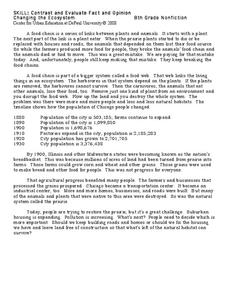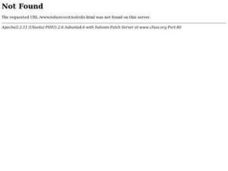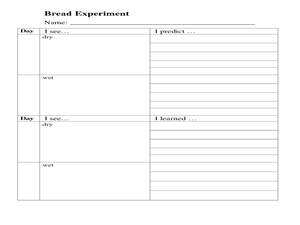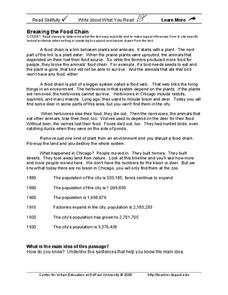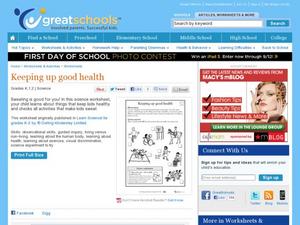DePaul University
Contrast and Evaluate Fact and Opinion
How can you tell when an author is expression an opinion or stating a fact? Use two short reading selections to emphasize the difference between a statement that you can prove and one that you can't. The first passage explains food...
K12 Reader
Habitat Destruction
What happens when an animal becomes endangered or extinct? Explore the ways that human influence throughout the environment has threatened the existence of other species with a reading passage. After reading the paragraphs, kids answer...
Curated OER
Solid Waste and Recycling
Students demonstrate effects of waste on environment and ways of reducing it, observe how much packaging goes into bag lunches each day, and survey their families to assess awareness levels and household recycling practices. Lessons all...
Curated OER
Owls: Top of a Food Chain
Although written for middle schoolers, there is no reason that a 3rd, 4th, or 5th grader could not also learn about food chains through the dissection of owl pellets. After you introduce the topic, learners complete an owl research...
Curated OER
Be Kind to Your Teeth
What kinds of food can be bad for your teeth? Kindergartners and first graders explore dental health with an interactive science inquiry. Given a choice of foods such as celery, cake, and milk, kids choose which ones are better for their...
Curated OER
Forest Decomposition
Students explore decomposition. Students define and describe components of the decomposition process. Students make a composter in a terrarium. Students record observations and changes weekly, drawing conclusions about the results of...
Curated OER
World of the Pond
Field trip! The class will review what they know about organisms that dwell in freshwater ponds, then trek down to the old water hole to collect specimens for examination. This includes several web links, useful tips, and an excellent...
Curated OER
it's Lonely At The Top
Students explore the differnences between food producers in food webs and food consumers in food chains. Behavioral choices of primary and secondary consumers such as herbivores, vegetarians, carnivors, and omnivors are analyzed.
Curated OER
Restoring and Protecting Chesapeake Bay and River Water Quality
A professional and comprehensive presentation on Chesapeake Bay water quality is in store for your ecology class. If you live in the Chesapeake Bay region and want to get learners involved in conservation efforts, this slide show will do...
DePaul University
Seasons on the Prairie
Fact and opinion passages inform readers about the seasons on the prairie and Zambia in Southern Africa. Then, test scholar's knowledge with multiple choice and short answer questions.
Curated OER
Natural Selection
Kids act as scientists and preditors in this short natural selection activity; they collect and analyze data, then apply their new knowledge to real-world examples of natural selection. The layout of the worksheet is easy enough to use...
Center Science Education
The Nitrogen Cycle Game
Earth science experts learn about the roles of nitrogen by taking a virtual journey through the nitrogen cycle. Completing a passport worksheet along the way, they move from place to place around the classroom by the toss of dice. Each...
Curated OER
Everything is Made of Something
Young scientists can use this worksheet to learn about natural resources, as well as what we use them for. A word search prompts pupils to find sixteen words about natural resources.
Desert Museum
Daisy Ecology
Here's a fine lesson that combines poetry with life sciences. Learners carefully listen to a poem that's all about a food chain. As the poem is read, learners name the producer, the herbivore, the carnivore, and the omnivore. Lots of...
Curated OER
Fossil Find
Students investigate the practice of digging for fossils. They participate in a mock dig of fossils using real bones and other artifacts. Then students dig through sand in order to go through the simulation. Students make observations...
American Museum of Natural History
What's the Big Deal About Paleontology?
Paleontologists could be considered detectives of the past. A quick online lesson describes the science of paleontology and the importance of fossils. Young scientists read about how paleontologists analyze the features of fossils to...
Curated OER
Fossil Kit II
Youngsters examine four fossil replicas and chart their time periods, vertebrate or invertebrate, and the names of other organisms living at the same time. A specific fossil kit is available for sale if you do not have the same samples....
NOAA
Climate Is Our Friend…Isn’t It?: Make an Extinction Polyhedron
Climate affects populations in different ways. Scholars research extinct organisms and mass extinctions in part three of the 10-installment Discover Your Changing World series. They create graphic organizers, then fill in the information...
DePaul University
Breaking the Food Chain
Throughout history, the growth of big cities has resulted in the destruction of ecosystems. In the case of Chicago, IL, a grassland that was once home to bison, deer, wolves, and foxes quickly became a booming city of over three million...
Curated OER
Seed Dispersal
Students explore seed dispersal by designing their own wind dispersed seed structure. Using one piece of paper and a box fan, they construct a seed dispersal structure, record the distance their seed travels, and answer discussion...
Curated OER
Food chains and webs
Here is an extremely simplistic look at food chains and webs. It depicts three different food chains, each containing a plant, plant eater, and meat-eater. Learners fill in the missing part of each chain by using the images provided at...
Curated OER
Keeping Up Good Health
During a discussion on sweating with your little ones, this resource should come in handy. Little learners place a check mark next to an activity pictured on the worksheet that would induce sweating. There are seven pictures to choose...
Curated OER
Dinosaurs
Students are introduced to the various types of dinosaurs and write in their journals about their favorite one. After listening to a story and watching a filmstrip, they color a few pages in their Dinosaur Friends Book. They also examine...
Curated OER
Butterfly Life Cycle
Focused little scientists will flitter their arms back and forth across the room with excitement as they learn the life cycle of a butterfly and how living things grow and change over time.


